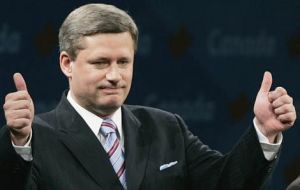MercoPress. South Atlantic News Agency
Canada Conservatives retain power in spite of global crisis
 Harper had been hoping his party would win enough seats to form a majority government
Harper had been hoping his party would win enough seats to form a majority government The Conservative party of Primer Minister Stephen Harper on Wednesday evening declared victory in Canada's general election, but has fallen short of securing a parliamentary majority.
Stephane Dion, the leader of the opposition Liberal Party, conceded defeat on Wednesday as preliminary results showed Conservative candidates had won in 144 of the 308 districts. "Canadians have voted and rendered their verdict and charted the way forward for our country," Harper told a crowd of cheering supporters in his home town of Calgary, Alberta. The Conservatives will still need opposition party support to govern as they have in the past two and a half years as at least 155 seats are needed to secure an outright majority in the House of Commons. As Dion conceded defeat after Tuesday's polls, he said that Harper would have his "full co-operation in these difficult economic times". He also appeared to rule out stepping down after the worst performance by the party since 1984. "Canadians are asking me to be the leader of the opposition and I accept that responsibility as an honour," he told a rally of supporters in Montreal. Early vote counts published on the website of Canada's election agency showed the Liberals in second place with 75 seats, while the Quebec-based Bloc Quebecois had 50 and the New Democrats 38 seats. But in spite of victory Harper's gamble to call early elections in order to gain a majority, had failed. He tried to campaign as a good economic steward but external events, including the crash on Wall Street last week, put Harper back where he started, leading a minority government. The Conservatives sought to put a good face on the results, which did at least increase their presence in the lower house of parliament. "Every other incumbent government in the Western world is in serious political trouble with the economic situation," Jason Kenney, a Conservative MP, said. "Ours is probably the only one that could be re-elected, let alone with an increased mandate." Harper was the first Western leader to contest an election since the global financial meltdown and a Conservative majority had looked within reach at times during the campaign. But besides questions on the economy, Harper lost major support in Quebec over cuts to arts funding and plans to give adult sentences to violent youth criminals. When it emerged during the campaign that another minority government was the most likely result, Harper faced criticism for having called the election in the first place at a cost of about C$300m ($260m) to taxpayers. But he said that even if he only got a second minority, he would be in a stronger position than he had been two and a half years into the minority mandate he won in the 2006 election, since opposition parties would be less likely to topple him for now.




Top Comments
Disclaimer & comment rulesCommenting for this story is now closed.
If you have a Facebook account, become a fan and comment on our Facebook Page!